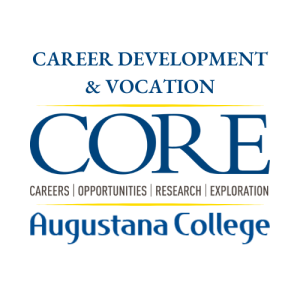Networking
These suggestions are based on several years of experience with the recruiting process and employer feedback. Most rules for networking are not set in stone, but strong guidelines. There is no one “right” way to network.
Define Your Expectations
It is important to understand what you want to gain from networking. You might want to learn about careers in general, learn the ins and outs of a specific career, build knowledge, and understand skills needed for a specific career field, find a job, explore options, etc. Decide why you are networking.
Understand Other’s Expectations
It is important to have a grasp on what to expect when meeting with people for a variety of reasons. Don’t just mention networking with jobs but discuss networks with Grad School and Post-Grad Service.
Develop Your Elevator Pitch
Discuss the component of identifying what you know and what skills you have to identify what you can learn and develop. This will help you create elevator pitch, market yourself, and hold conversations.
Preparing an Elevator Pitch
Build Your Network
Grow your network by thinking about who you know who might be able to assist in meeting your networking goals. LinkedIn is built to help manage your network and contacts.
- Coaches
- Colleagues
- College Administrators
- Current/Former supervisors
- Family
- Friends
- Neighbors
- Peers
- Teachers/Faculty
Once you’ve developed a list of people you would like to add to your network you can begin to connect with them and invite them into your network.
Networking Events
Most communities offer in-person and virtual networking events. Take advantage of these opportunities meet and interact with new professionals who might be useful to you as you build your network.
Career Fairs and Career Events
Employers, recruiters, and schools often gather at career fairs to provide an opportunity for job seekers to meet in one location. Employers may be recruiting for specific job openings or may wish to connect with participants to provide information on the company and future employment opportunities.
Access upcoming Career Fairs and Career Events on Handshake
Professional Association Meetings and Conferences
A professional association, or professional organization, is an association made up of members who are part of the same industry or career field. Professional Associations often hold conference, events, and meetings where members can stay up to date on the latest trends in their industry and to network with others in their field. Most popular professional organizations are recognized nationally, and individuals who are part of these organizations are often looked on favorably by employers.
Search online for professional associations in your field; look for student membership or open events
Chambers of Commerce events
Chamber of Commerce groups hold regional events like mixers, workshops, fundraisers for local charities, and business meet ups. These events provide an excellent opportunity to meet prospective local employers, business partners, clients, and suppliers.
Access Quad Cities Chamber of Commerce
Access Directory of US Chambers of Commerce
Networking Websites
There are many ways to find events, conferences, and specifically networking-focused events, all categorized by geographic location. Two of the most popular and well-known sites include:
- Meetup: Explore free and low-cost in-person meet-ups in your industry, whether it’s beauty, tech, photography, or something else. There’s also a category for “career and business events” with a wide variety of career-focused groups that meet regularly.
Access Meetup - Eventbrite: This event-based site has listing pages for free and paid events. You’ll find fairs, festivals, discussions, conferences, classes, and much more.
Access Eventbrite
Church Groups
Church groups provide a forum for casual networking with people holding common spiritual beliefs through participation in socials, coffee after services or church charities.
Viking Connections
Viking Connections is Augustana College’s Career Alumni Connector Network designed to connect accomplished alumni with current students and fellow alumni. Alumni Connectors are available to share advice on careers, industries, employment trends, and organizations within their areas of expertise. These mentoring relationships are meant to provide valuable support and guidance to student and alumni mentees as they navigate their careers, explore new career paths, or consider graduate school.
Community Service Groups
Community service groups like the Rotary Club provide the opportunity for volunteers to staff fundraisers and other events whereby they will interact with donors and other volunteers. Your shared charitable tendencies can often serve as a bridge and cast you in a favorable light. Joining a service group is a great way to aid your fellow community members and build up your network. Obviously, you shouldn’t join just to build your network. It’s important that you’re sincere about your service.
Search online for community service groups and events that interest you; look for open events
Affinity/Diversity Groups
Affinity groups bring together people with something in common, such as their background, identity, or interests. In the workplace, this could mean many things—a group for African American employees, for working moms, for women, for LGBTQ+ employees, or all sorts of other categories. Often, affinity groups are associated with diversity initiatives.
Search online for affinity or diversity groups and events that interest you; look for open events
Engaging Your Network
Crafting a brief yet informative introduction or follow up email get the conversation going. An engaging message is your first – and perhaps only – first impression! For consistency and simplicity reasons, consider customizing the message below with one or two things you are interested in learning more about. This could be their career field, their job title, their location, and their major, really anything they listed on their profile.
Subject: Hello! A quick question from Augustana Student
Dear <First Name>,
I am currently a <Year in College> pursuing a degree in <Your Degree/Major>. We met last week at the Midwest Association of Colleges and Employers networking event. I would like to connect with you on LinkedIn and learn more about ____________________.
I would love to hear more about what you do and any insights or advice you might have on
________________________________________________________________________.
Any help would be extremely appreciated!
Thanks,
Name
Cell Number
Important: the purpose of this letter is NOT to ask for a job. “Hi! It’s nice to meet you. Want to hire me?” is not effective networking. Be discrete. Be patient!
Communicating with Someone from Your Network
Effective communication is essential to any healthy relationship and a mentorship is no exception. Be professional in all your communications, whether it is through email, over the phone, via Zoom, or in person.
While you may not be accustomed to using e-mail as your primary method of communication, it is the preferred way for most seasoned professionals to keep in touch. Developing professional email practices and decorum now will help you in the future. It is professional and polite to respond to emails with at least an acknowledgement within 24-48 hours of receiving the email. Students have found these guidelines to be helpful.
Communication Tips
- Talk and/or meet on a regular basis.
- Establish a set date and time to talk (i.e. every other Tuesday night at 8 p.m.); always set up and confirm your next meeting before your previous one ends. If you are unable to make it for a scheduled meeting, contact your mentor as soon as possible. You wouldn’t want to be stood up, so make sure you don’t do the same to your mentor!
- Be honest with your mentor about your schedule. Don’t skip class, review sessions, or office hours if you need to attend. Your mentor was once a student and understands your academic responsibilities.
- Develop an agenda for each conversation. Have questions and topics ready to discuss. Many mentors are taking time out of their workday to talk with you, so you want to make sure you make the most of your time together. Also, remember that they are respecting your time as a student, so you should respect their time as a professional and come to the conversation prepared!
Additional Tips
- Remember that networking IS NOT asking someone for a job. Networking is about building your professional network that could lead to referrals.
- Recognize that internship and job placement assistance is often a very personal and always a highly professional matter

